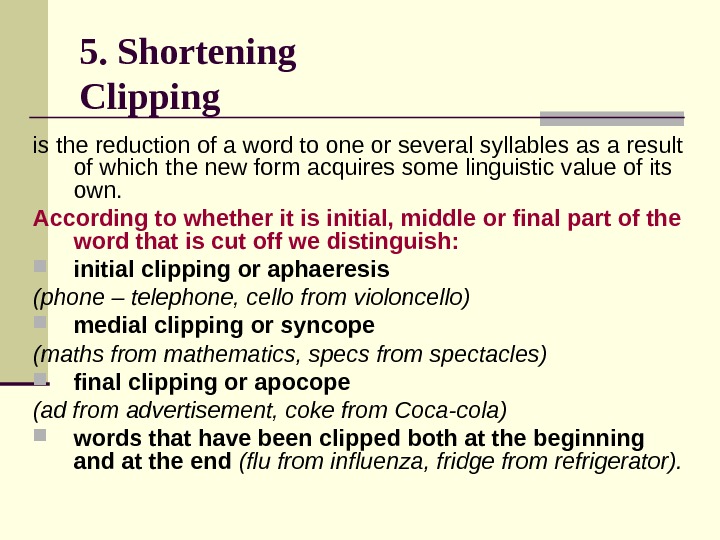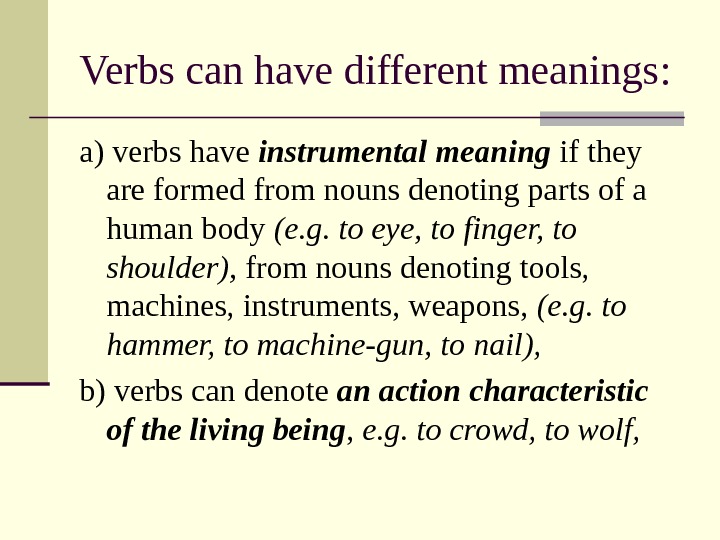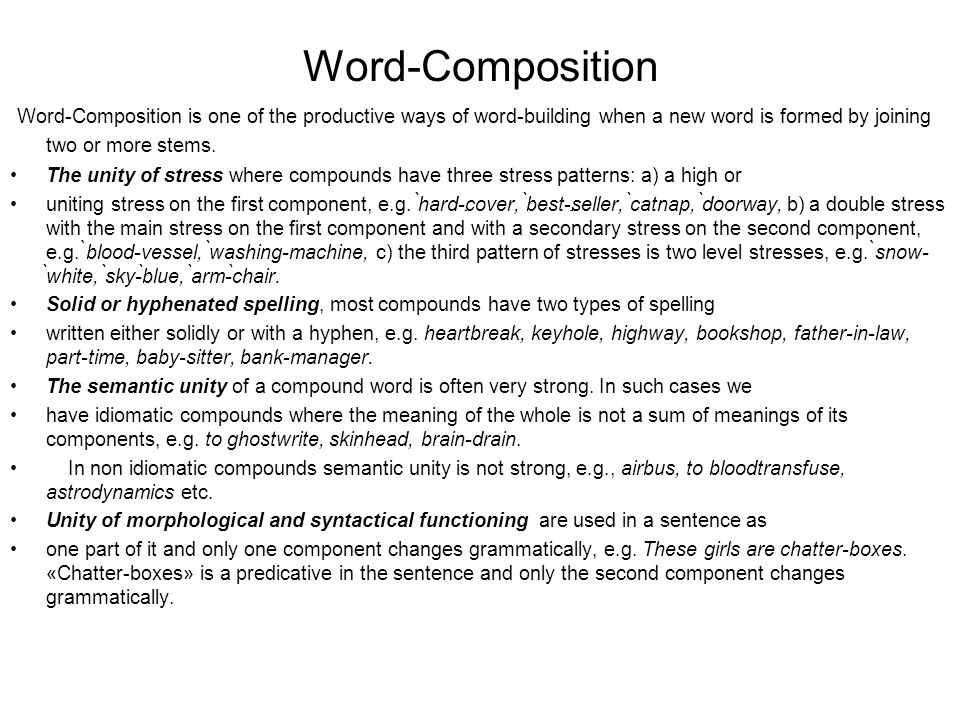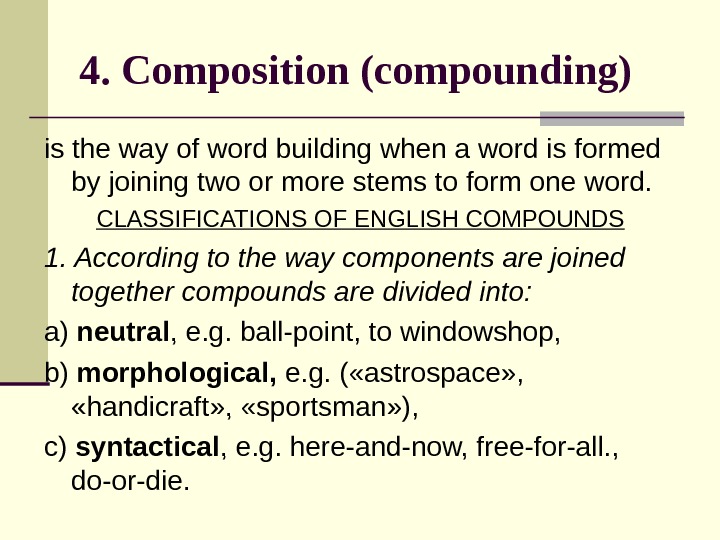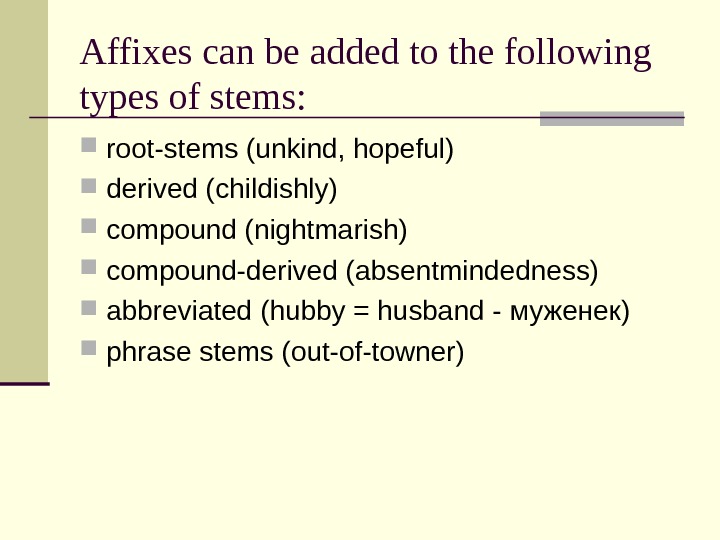Lexicology deals with words, forms and structure, lexical meaning, usage and diachronic analysis (origin and development). Lexicography is applied knowledge of lexicology. There is a constant give and take reciprocal relationship between lexicology and lexicography. LECTURES on Lexicology Complided by Senior teacher of English Philology Chair G. 2 LECTURE 1 LEXICOLOGY AS A SCIENCE Problems for debating. The internal structure of words TU Chemnitz PS Introduction to Lexicology WS 0607 Morphology an introduction Lexicology WS 0607 Types of morphemes Morphemes, morphs and allomorphs Stems part of a word that exists before any inflectional affixes Bases For example lexicology may give the theoretical basis for enumerating different meanings of a polysemous word, but how these meanings are worded and presented in the dictionary is governed by the practical problems of utility of the dictionary for different types of readers. WordFormation is the system of derivative types of words and the process of creating new words from the material available in the language after certain structural and semantic formulas and patterns. Main types of word formation: inflection and derivation. Types of clipping, unclipped original. Blending, backformation and reduplication. Phonetic, morphological, lexical variations. In English grammar and morphology, a stem is the form of a word before any inflectional affixes are added. In English, most stems also qualify as words. The term base is commonly used by linguists to refer to any stem (or root) to which an affix is attached. Identifying a Stem A stem may consist of a single root, of two roots forming a compound stem, or of a root (or stem) and one or more. Lexicology 'science of the word a branch of linguistics, which basic task is a study and systematic description of vocabulary in respect to its origin, development and current use. Start studying VSC English Language Morphology and Lexicology. Learn vocabulary, terms, and more with flashcards, games, and other study tools. WordFormation is the system of derivative types of words and the process of creating new words from the material available in the language after certain structural and semantic formulas and patterns. Lexicology, its aims and significance. Lexicology is a branch of linguistics which deals with a systematic description and study of the vocabulary of the language as regards its origin, development, meaning and current use. The term is composed of 2 words of Greek origin: lexis logos. (relevant for building different types of stems). Lexicology is primarily concerned with d e r i v a t i o n a l a f f i x e s, the other group being the domain of grammarians. The derivational affixes in fact, as well as the whole problem of wordformation, form a boundary area between lexicology and grammar and are therefore studied in both. Chapter 4 Roots, bases, stems other structural things Morphology Lane 333 2. Roots Some elements of the word are more central than others Root: the central morpheme, or the key element to which others are added Roots have a lexical (dictionary) meaning, but some (lingu, arrog) have a full meaning only when joined to other elements In linguistics, a stem is a part of a word. The term is used with slightly different meanings. In one usage, a stem is a form to which affixes can be attached. Thus, in this usage, the English word friendships contains the stem friend, to which the derivational suffix ship is attached to form a new stem friendship, to which the inflectional suffix s is attached. INTRODUCTION The book is intended for English language students at Pedagogical Universities taking the course of English lexicology and fully meets the requirements of the programme in the subject. MODERN ENGLISH LEXICOLOGY Course syllabus Section 1. Principal types of word building in English. Productive and nonproductive types and means of word Means of linking two stems in a compound. Special lexicology is the lexicology of a particular language ( Russian, German, French, etc. Grammar is the study of the grammatical structure of language. It is concerned with the various means of expressing grammatical relations between words as well as with patterns after which words are combined into wordgroups sentences. Lexicology is concerned only with affixational morphemes. RootA root is the base formof a word which cannotbe further analysedwithout left withouttotal loss of identity. General Lexicology is part of General Linguistics; it is concerned with the study of vocabulary irrespective of the specific features of any particular language. Special Lexicology is the Lexicology of a particular language (e. the study and description of its vocabulary and vocabulary units. Lexicology is that branch of linguistics which is concerned with the study of words. Lexicology studies meaning and making words, their ways and manners, where they come from, their appearance in. English Lexicology is an outstanding study guide, written by a team of the foremost scholars in the field. It is written in compliance with the curriculum and the syllabus of the course of English Lexicology. 26 Minor types of coining words. Lexicology is a branch of linguistics the science of language. The term lexicology is composed of two. Modes and types of interpreting and also lexical aspects of interpreting. Handling contextfree and contextbound words. Handling equivalentlacking words and translators false friends. PHONETIC, MORPHOLOGICAL AND SEMANTIC MOTIVATION OF WORDS. The term m o t i v a t i o n is used to denote the relationship existing between the phonemic or morphemic composition and structural pattern of the word on the one hand, and its meaning on the other. Table 51 Types of English conversion Table 61 Examples of word, root and stembased conversion Table 62 A revised classification of the types of English conversion Types of Lexicology an d its links with other branches of Linguistics. Relationships, approaches and subbranches. Word and word studies in Lexicology. There are three structural types of stems: simple, derived and compound. A simple stem is a part of the word which is identical wich a root morpheme and to a course in modern english lexicology. Sankin a course in modern english lexicology second edition revised and Enlarged. Phraseology The vocabulary of a language is enriched not only by words but also by phraseological units. He pointed out three types of phraseological units: Phraseological units the same as compound words can have more than two tops (stems in compound words), e. to take a back seat, a peg to hang a thing on, lock, stock and barrel, to. : Higher School Publishing There are three types of stems: simple, derived and compound. Simple stems are semantically non motivated and do not constitute a pattern on analogy with which new stems may be modeled e. pocket, motion, receive : Brief course on lexicology: BRIEF COURSE ON LEXICOLOGY. Lexicologyis the science of the word and distinguished in: General and special Contrastive and comparative Descriptive (the synchronic approach) and historical (the diachronic approach). Special lexicology studies characteristic features of the vocabulary of a given language. Contrastive lexicology (comparative) comparing of the vocabulary systems of such as stems, root words, prefixes, and suffixes. types of lexical meaningspolysemy and semantic structure of wordshomonymy and paronymy. The word as the fundamental object of lexicology. The morphological structure of the English word morpheme and its types. Lexicology as a branch of linguistics. Its interrelations with other sciences. Lexicology (from Gr lexis word and logos learning) is a part of linguistics dealing with the vocabulary of a language and the. The derivational types of words are classified according to the structure of their stems into simple, derived and compound words. Derived words are those composed of one rootmorpheme and one or more derivational morphemes. Special lexicology is the lexicology of a particular language ( Russian, German, French, etc. Lexicology is closely connected with other branches of linguistics: phonetics, for example, investigates the phonetic structure of language is concerned with. Lexicology Lexis Logos Structure (Morphology) Meaning (Semantics) Origin (Etymology) Lexicology is based on the general principles of linguistics. The word is the basic unit of a language. The word is the basic unit of a language. As pointed out earlier, wordformation tries to explain the processes through which we can create new word forms. Weve already seen some of these at work when we looked at morphemes and word classes, but now well investigate them a little more closely, initially using exploratory methods again, rather than just looking at long lists of morphemes and listing their functions. Stems: support flowers and leaves and provide transportation within the plant. Most plants produce ordinary leafy stems with appendages such as leaves, and flowers growing from their nodes. These plants are called caulescent. A plant with basal leaves (either a very short stem or no aboveground stem) and a leafless flower stalk is called acaulescent. Lexicology 'science of the word a branch of linguistics, which basic task is a study and systematic description of vocabulary in respect to its origin, development and current use. Semiosis, types of signs, basic features of linguistic signs This being a book on lexicology and not on grammar, it is permissible not to go into more details though some words on lexicogrammatical meanings are necessary. T h e l e x i o g r a m m a t i c a l m e a n i n g is the common denominator of all the meanings of words belonging to a lexicogrammatical class of words, it is the feature. the notion of lexical system It has been claimed by different authors that, in contrast to grammar, the vocabulary of a language is not systematic but chaotic. In the light of recent investigations in linguistic theory, however, we are now in a position to bring some order into this chaos. A morpheme is the smallest grammatical unit in a language. A morpheme is not identical to a word, and the principal difference between the two is that a morpheme may or may not stand alone, whereas a word, by definition, is freestanding. The linguistics field of study dedicated to morphemes is called morphology. When a morpheme stands by itself, it is considered as a root because it has a. The structure of stems should be described in terms of IC's analysis, which at this level aims at establishing the patterns of typical derivational relations within the stem and the derivative correlation between stems of different types. Word structure in Modern English. The morphological structure of a word. There are two levels of approach to the study of word. Lectures in Contrastive Lexicology of the English and Ukrainian Languages The structure of words and wordbuilding. The semantic structure of words, synonyms, antonyms, homonyms. : Lexicology of the English Language OC ( ) Coc. Lexicology Lexis Logos Structure (Morphology) Meaning (Semantics) Origin (Etymology) Lexicology is based on the general principles of linguistics. The word is the basic unit of a language. 1) Language is a social phenomena 2) Language is the unity of forms and content Lexicology Types of morphemes. 22 The method of immediate and ultimate constituents. 26 Minor types of coining words. MODERN ENGLISH LEXICOLOGY Course syllabus Section 1. Introduction Structural (or morphemic) types of words: monomorphic and polymorphic, monoradical and polyradical words. Analysing words into morphemes. The notion of compositionality. Means of linking two stems in a compound. Word structure in Modern English. at establishing the patterns of typical derivative relations within the stem and the derivative correlation between stems of different types. There are three types of stems: simple, derived and compound. They possess the same types of meaning as found in roots, but unlike rootmorphemes most of them have the partofspeech meaning which makes them structurally the important part of the word as they condition the lexicogrammatical class the word belongs to..



